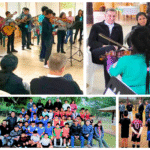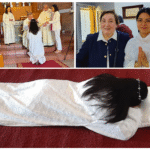By F. Luis Casasus, General Superior of idente missionaries
Commentary on the on the Sunday Gospel of 26-3-2017 (Fourth Sunday of Lent) (1st book of Samuel 16:1b.6-7.10-13a; Letter to the Ephesians 5:8-14; Saint John 9:1-41)
- It is not difficult to draw some valid conclusions from today’s Gospel reading, mainly to be aware of our multiple forms of blindness:
- We cannot see the consequences of our actions (both good and bad).
- We cannot see the superficiality of our judgments, like Samuel in today’s reading.
- We need a special grace to see the source of our sins, our Dominant Defect.
- We think that with power, status and popularity we will be happy, but we are like the poor man who found a priceless treasure: he lost his peace and safety because people were after his life as they wanted to have the treasure as well.
Especially, pride blocks our ability to see the truth. Like the religious leaders in the Gospel, the sin of pride is not due to ignorance but simply the refusal to see. These are some types of moral blindness.
In our Ascetical Examination we have the Attachment to our Judgments, that is a blindness of the mind, where we assume that what is traditional, comfortable, and familiar to us provide a framework for one’s life that cannot be questioned. Sometimes we are dazzled by intellectual understanding and believe that all problems have one rational solution, which is our solution.
We cling hard to our ideas and ideals and demand that everyone believe in us as much as we do. The some applies to our will, when we are victims of our Attachment to our Desires.
But there is a more essential blindness, reflected in the miracle of today’s Gospel: We are unable to discern the presence of God in our life and in the lives of our neighbors. And this blindness ignores something essential to our human constitution:
The Spirit of truth, whom the world cannot receive, because it neither sees Him nor knows Him; but you know Him, for He dwells with you and will be in you (Jn 14: 17).
I have been crucified with Christ and I no longer live, but Christ lives in me (Gal 2: 20).
This was the Pharisees’ blindness. A person who chooses not to see is guilty and commits the sin against the Holy Spirit. Sometimes, our life is a little like that of the Doctors of the Law: from the height of our pride we judge others, and, in the end, we judge God too! Today we are invited to be enlightened by Christ in Baptism, so that, as Saint Paul notes, we can walk as children of light (Eph 5:8), with humility, patience and mercy. These doctors of the law did not have humility, patience or mercy!
In fact, as C.S. Lewis said: We may ignore, but we can nowhere evade, the presence of God. The world is crowded with Him. He walks everywhere incognito.
- Here is, perhaps, one of the most painful and difficult episode of blindness: Many times, there are no answers to our sufferings that can truly be satisfying. However, suffering can draw us closer to the mercy and love of God. This is not always easy to understand. Thisblindness is our condition of creature; as blind people, we make many mistakes and therefore, on the cross, Jesus prayed: Father, forgive them for they know not what they were doing.
- One beautiful way to take advantage of the presence of God daily is in the interruptions. In the face of any interruption, we should say to God, You are here. At the moment any interruption occurs, remind yourself that you are in the presence of Christ, who had time for people who questioned and interrupted. Remember that some of Jesus’ most gracious miracles occurred when he was interrupted. What is it like for you to offer yourself to be present to God during interruptions?
-
- This is not the only time that Jesus heals a person using His saliva. Remember how He opened the ears of a deaf man (Mk 7: 31-37) using his spit as a healing agent. This is pretty shocking, because spitting had (and has today) a connotation of contempt. But Christ is telling us: What you think is real, is not actually real and what you think is true, is actually not true. The spittle-miracles fit right into that didactic construct. Essentially Jesus was saying: So, you think spit is an insult; you think spit is unclean? Well, let me show you what spit was capable of from the beginning, before sin came into the world. Jesus’ teaching method is pointing us back to who we were created to be, and what the Sacrament of Baptism restores of us to.
In this way, Christ shows how he communicates God’s grace to us in ways appropriate to our human nature, which includes both body and spirit. Jesus wants to reach into our lives, to lower himself to our level, to touch us, even physically. Christ’s touch gave the blind man hope and confidence, making the miracle into a personal encounter, not a magic trick.
- There is a long and vigorous discussion between the healed man, his parents and the Pharisees centered on the issue of the personality and the authority of Jesus. But the decisive factor, the essential event was the healing experience of the blind man, an experience capable of decisively determining whether or not a particular hypothesis or theory is superior to all other hypotheses. This is a key element of the Scientific Method…the blind man was quite modern! This is why our Father Founder says that Mysticism is an experimental (and experiential) science: it is more than belief, more than faith, more than understanding.
This is, after all, the very situation in which we now find ourselves.
And it is also for this reason that Pope Francis emphasizes the importance of spiritual memory, that is, to always keep in mind all that God has done in my life, shaping me into the person I am today and keeping me in the way.
- 6. What is the starting point of this divine action? Recollection and Quietude. These preliminary acts or movements in our soul are not strictly Purification or Union, but successive changes in our sensitivity, just like a clean environment and a soft music are an invitation to a conversation or to have a relaxed lunch; just like listening a fragment of a work by Beethoven can awaken a long-standing passion for classical music.
The Holy Spirit transforms our sensitivity and this is enough to trigger dramatic and unexpected changes in our life. It is a process: Initially, the blind man encountered Jesus through His mercy and compassion and he came to realize that Jesus was surely a holy man, a prophet and the Son of Man. As a consequence of his growing faith and understanding, he worshipped Him.
As the Lord said to the prophet Samuel: God does not see as man sees; man looks at appearances but the Lord looks at the heart. This is a true change of sensitivity, just as when we fall in love.
Those that would be healed by Christ must be ruled by him. He came back from the pool wondering and wondered at; he came seeing. Today, we have to renew our promises by washing ourselves in the pool, making a sincere confession so that we can see the truth about ourselves clearly and to see Christ. The blind man is asking us as well: Do you want to become his disciples too?
Let us conclude with some words of Pope Francis who, in one of his inspired speeches, identifies blindness with enclosedness and self-sufficiency:
Let us ask ourselves about the state of our heart. Do I have an open heart or a closed one? Open or closed to God? Open or closed to my neighbor? We always have some closure in us born of sin, of mistakes, of errors. We must not be afraid! Let us open ourselves up to the Lord. He awaits us always and wants to help us see better, to give us light, to forgive us. Let us not forget this! To the Virgin Mary we entrust the Lenten journey, so that we too, like the blind man who was healed, can with the grace of Christ come to the light, make progress toward the light and be reborn to a new life (March 30, 2014).











